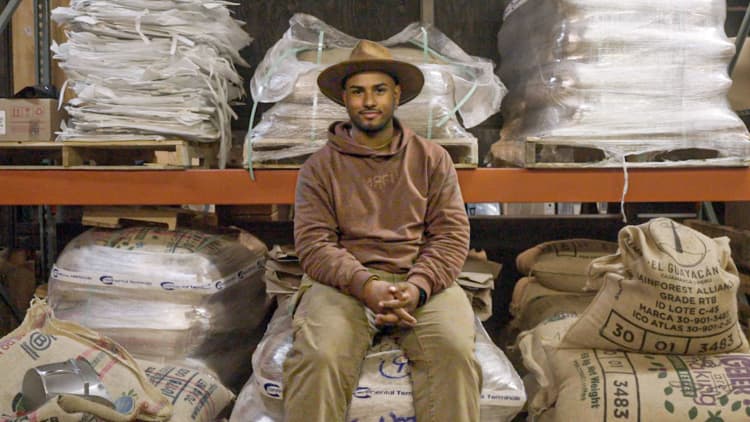When Jordan Gibbs was laid off from Lyft in November, she joined thousands of other tech workers suddenly on the job market.
But as a recruiter with eight years of experiencing hiring in tech, Gibbs, 31, had a leg up in terms of getting organized for her impending job search. She even documented the whole thing on TikTok, first as means of keeping herself motivated, and then because viewers commented they were going through the same thing and wanted to learn from her.
For the next two months, she vlogged everything from filing for jobless benefits to creating a job-search spreadsheet and going through countless rounds of interviews across the Bay Area and in New York City.
And after 69 days, 173 job applications, 42 interviews and 2 rejections, she accepted an offer in January and will start a new job with Bloomberg in February.
Here are the five biggest job-interview tips that helped her land an offer:
Never count your chickens before they hatch
Throughout her more than two months on the job market, Gibbs says she never stopped applying for new openings, even as she entered final rounds of interviews with some companies.
Her thinking? "Never count your chickens before they hatch," she says. "Sometimes you think you have it in the bag, and you don't."
For example, Gibbs received one rejection on day 48, even after she'd been to an interview onsite. If she'd stopped applying to new positions and focused only on that one opportunity, she'd then have to start back at square one and would be "out of a job for another month" at least, she says.
Gibbs also recommends casting a wide net to find a new job. She leaned heavily on referrals and tapped her professional network for introductions to hiring companies. But she didn't totally ignore cold-applying to jobs (that's ultimately how she got in touch with Bloomberg), though she knows it's typically less successful, especially so in today's tech market.
At the end of the day, the roles she got final offers for came from a mix of referrals and cold-applications.
Over-prepare
Early on, Gibbs kept track of her many applications and interviews using a spreadsheet to document each company, the role, who she was in contact with and what interview stage she was in. She recommends job-seekers find their own method to stay organized.
Her approach to interviews comes down to one thing: over-prepare. Gibbs says she built out a dossier for every company she interviewed with to understand their leadership team, key achievements, where their money comes from (or for startups, what round of funding they were in), and so on.
Not only did it help her understand each team better, but it also helped her stand out in interviews by asking thoughtful questions based on extensive research.
Be honest about what you don't know
As with her vlogs, Gibbs says she was honest and transparent in interviews about how she felt about each opportunity, including what was exciting to her and what challenges she might have to address.
"People go into interviews and oversell themselves," she says, but "I think something that resonated with me and in interviews is being honest about the things you don't know."
For example, the new job she'll be starting is in financial media, whereas her experience so far has been squarely within tech.
But instead of overstating skills or experience she doesn't have yet (or completely ignoring the gaps), she says she framed it as: "These are the things I think I would be fantastic at learning."
"They can appreciate that I'm a smart person and recognize it would be a learning curve," she says.
Make your thank-you note stand out
Make sure to get the email address of your interviewer and follow up with a brief but sincere thank-you message.
Put in some effort to personalize it — "not just surface-level stuff," Gibbs says. Express your appreciation for their time and thoughtful questions (if you can refer back to any part of your conversation, all the better).
People will appreciate the positive feedback on what you enjoyed about the discussion, she says.
Nail the final interview
Acing the final round of interviews could be key to locking in your final salary — at least from Gibbs' experience as a candidate.
She's found that if her conversation is with someone up the corporate chain of command (like the hiring manager's boss), chances are good the job is hers — but the discussion could dictate how much money she's offered.
Senior leaders could be trying to assess, "Can this person really command what they're asking for?" Gibbs says.
"That's why I think final conversations are more nerve-wracking to me," Gibbs says in a video, "because I have confidence in myself that I can get a job, but I've got to pay my bills."
Use this final conversation to play to your strengths and rehearse your elevator pitch — the expertise you'll bring to the team, your enthusiasm for the job and your smart ideas of how you'll help the company excel.
Check out:
A 'horror movie' come to life: Workers are using TikTok to broadcast their layoff
After a rescinded job offer and dead-end interviews, this 35-year-old launched his own business
Worried about a gap in your resume? This small tweak could result in more job callbacks
Sign up now: Get smarter about your money and career with our weekly newsletter



